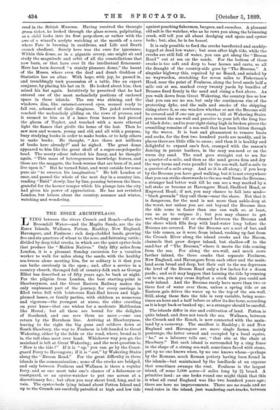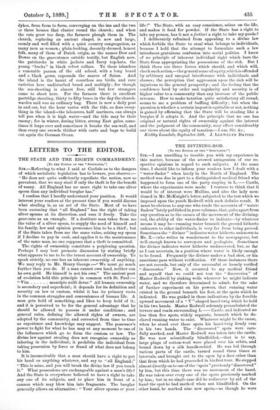THE ESSEX ARCHIPELAGO.
TTING between the rivers Crouch and Roach—alias the Broomhill Water—and the Maplin Sands, are the six Essex Islands, Wallasea, Potton, Rashley, New England, Havengore, and Foulness : rich deep-clodded lands, growing five and six quarters of wheat to the acre, and fattening cattle ; divided by deep tidal creeks, in which are the quiet oyster-beds that produce the " 'Weldon Natives." Only fifty miles from London, it is a pleasant Sunday excursion for a vacation worker to walk for miles along the sands, with the healthy sea-breeze alone meeting him, for so solitary is it that you can bathe carelessly in the open ; and, after a service in a country church, thronged full of country-folk such as George Elliot has described as of fifty years ago, be back at night. For the pilgrim from London, the best starting-point is Shoeburyness, and the Great Eastern Railway makes the only unpleasant part of the journey, for every carriage is filled twice full with boisterous East-End lovers and high- plumed lasses, or family parties, with children so numerous and vigorous—the youngest at nurse, the elder crawling on your knee—that one wishes for a moderate Malthusian like Herod ; but all these are bound for the delights of Southend, and one sees them no more ;—one can return by the Burnham line. Arriving at Shoeburyness, leaving to the right the big guns and soldiers down at South Shoebury, the way to Foulness is left-handed to Great Wakering, either by the fields or the road, where, broad as it is, the tall elms meet over head. Whichever way you go, the mainland is left at Great Wakering; and the next question is, " How is the tide ?" If it is " up," you can go by the Coast- guard Ferry to Havengore; if it is " out," by Wakering Stairs along the " Broom Road." For the great difficulty in these islands is the communication ; none of the creeks are bridged, and only between Foulness and Wallasea is there a regular ferry, and so one must take one's chance of a fisherman or coastguard, or an oyster-watcher to put one across at a discretionary fee ; but often you may shout loud, long, and in vain. The oyster-beds lying inland about Potton Island and up to the Crouch are carefully patrolled at high and low tide against poaching fishermen, bargees, and ourselves. A pleasant old salt is the watcher, who as he rows you along the brimming creek, will tell you all about dredging and spate and oyster beds ; but, alas, he is too honest.
It is only possible to ford the creeks barefooted and muddy- legged at dead low water; but soon after high tide, while the creeks are still full of water, you can get along the " Broom Road" out at sea on the sands. For the bottom of these creeks is too soft and deep to bear horses and carts, so all the draught of the country-side goes by " The Brooms." A singular highway this, repaired by no Board, and minded by no waywarden, stretching for seven miles to Fishermen's Head, near the point of Foulness, along the level sands half a, mile out at sea, marked every twenty yards by bundles of Brooms fixed firmly in the sand and rising a foot above. As you walk down from Great Wakering, the country lies so low that you can see no sea, but only the continuous rim of the protecting dyke, and the sails and smoke of the shipping rising above it, so one wonders whether or not the Brooms will be covered and if one can get across ; till at Wakering Stairs you mount the sea-wall and perceive to your left the long line of black dots ; and to your right rising high in broken pieces the crumbling remains of a sea-wall that has been bitten through by the waves. It is best and pleasantest to remove boots and socks, for the first two hundred yards are muddy, and in places there are little rills to cross ; and then it is healthy and delightful to expand one's feet, cramped with the season's dancing in patent leathers, in the oozy sea-mud or on the warm dry sand. The road goes straight out to sea for a quarter-of-a-mile, and then as the sand grows firm and dry the way turns and runs parallel to the sea-wall, half-a-mile to a quarter-of-a-mile away. And so it is all along ; if you keep by the Brooms you have good walking, but it is not everywhere that you can strike shorewards to the sea-wall from the Brooms;. a stranger had better wait till he can see a way marked by a. tall stake or brooms at Havengore Head, Shelford Head, or Rngwood Head ; if not, you may chance to fall into mud- " black grounds" they call them—near the shore. Not that it is dangerous, for the mud is not more than ankle-deep at. the worst, nor unless you are out beyond the Brooms does the tide come in faster than one can walk or, at least, run so as to outpace it ; but you may chance to get wet, wading some rill or channel between the Brooms and the shore which fills deep with land-water long before the Brooms are covered. For the Brooms are a sort of bar, and the tide comes, as it were, from inland, rushing up fast from the Crouch River along the island creeks and the Haven, channels that grow deeper inland, but shallow-off to the sand-bar of " The Brooms," where it meets the tide coming from the sea. For along the sea-wall, and much more farther inland, the three creeks that separate Foulness, New England, and Havangore from each other and the main- land seem broad and deep, but their exit to the sea depresses the level of the Broom Road only a few inches for a dozen yards ; and soit may happen that turning the tide by running out to sea, you may cross dryfoot a creek that you could not wade inland. And the Brooms rarely have more than two or three feet of water over them, unless a spring tide or an. Eastern gale drives the water up to the top of the sea-wall. • Still, along these flats the tide is very variable, being some- times an hour and a half before or after its due hour, according as it is kept back or banked up ; so a stranger should be careful.
The islands differ in size and cultivation of land. Potton is quite inland, and does not touch the sea. Wallasea, between the Crouch and the Roach, is now connected with the main- land by a causeway. The smallest is Rashley ; it and New England and Havengore are mere single farms, mainly pasturage, the latter owned and occupied by a local squire,
he," as a labourer tells one, " that sits at the chair at. Shoebury." But each island is surrounded by a ring fence in the shape of a strong sea-wall, sometimes faced with stone, put up no one knows when, by no one knows whom—perhaps by the Romans, much Roman pottery having been found in the islands—but maintained by the landlords at an expense that sometimes swamps the rent. Foulness is the largest island, of some 5,000 acres-5 miles long by 2i broad. A primitive land : as one looks round one might think that this is what all rural England was like two hundred years ago ; there are here no improvements. There are no roads and no road-rates in the island, just wandering cart-tracks, between
dykes, from farm to farm, converging on the inn and the two or three houses that cluster round the church ; and when the ruts grow too deep, the farmers plough them in. The church, replacing an ancient chapel, is new and large, seemly and well filled with a quiet country congregation, as many men as women ; plain-looking, decently-dressed, honest folk, many of them of Dutch origin, as the names Dow and Dowse on the gravestones outside testify, but English now, the patriarchs in white jackets and furry top-hats, the young "bucks" in black velvet collars. To these islanders a venerable parson of the old school, with a long beard and a black gown, expounds the snares of Satan. And the island is the haunt of countless sea birds, and rare varieties here undisturbed breed and multiply ; for though the sea-shooting is almost free, still but few strangers come to shoot here. For the farmers there is excellent partridge shooting, thirty to fifty brace in the day the church- warden said was an ordinary bag. There is now a daily post in and out, but the hour varies with the tide, as does every- thing in the island—the labourers, half mariners, can always tell you when it is high water—and the tide may be their enemy; for in winter, during bitter, strong East gales, some- times it leaps over and sometimes it breaks the sea-wall, and then every one crowds thither with carts and bags to build out again the German Ocean.







































 Previous page
Previous page